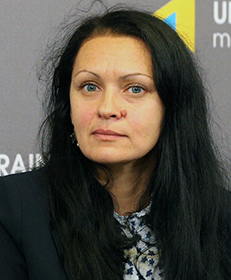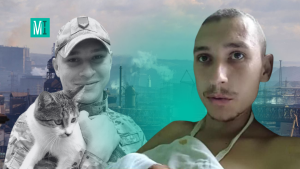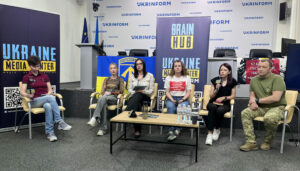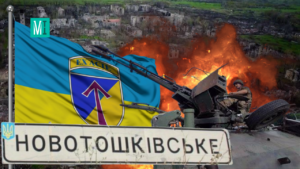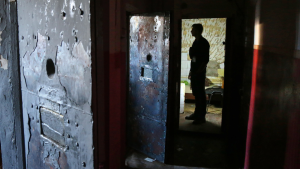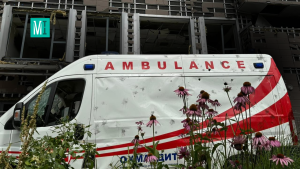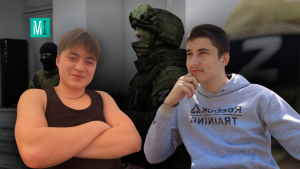Void sentences. Russia-controlled “courts” of Donetsk and Luhansk have convicted three Ukrainian military
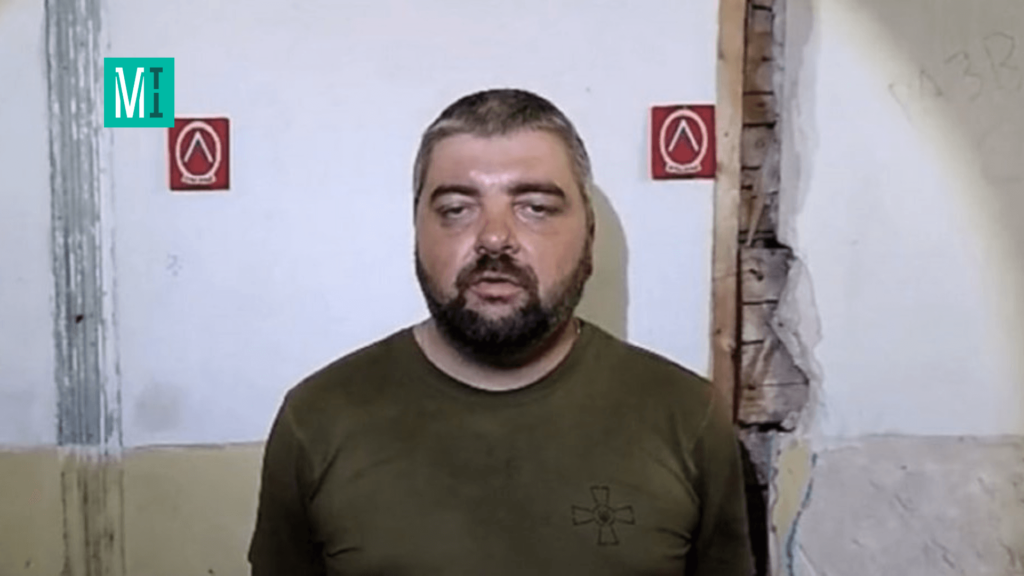
So-called courts in occupied Donetsk and Luhansk have condemned to imprisonment Maksym Butkevych, Viktor Pokhozey, and Vladyslav Shel. They claim that these military had committed war crimes in Mariupol and Severodonetsk.
8.5 to 18.5 years of prison
On March 10, 2022, it became known that Maksym Butkevych, a Ukrainian journalist, human rights activist, and military, was “sentenced” in occupied Luhansk to 13 years of the colony with a strict regime. The “judgment” was pronounced by the so-called supreme court and reported by the Investigative Committee of the Russian Federation (IC RF). Apart from that, it became known about sentences passed in Donetsk on two other Ukrainians: Viktor Pokhozey and Vladyslav Shel. They received sentences of 8.5 and 18.5 years of colony accordingly.
According to the Investigative Committee, Butkevych was found guilty of alleged “cruelty to civilians and use of illicit methods in the armed conflict”. The “court” also considers Butkevych to be implicated in “the attempted murder of two persons in a publicly dangerous manner and willful damage to other persons’ property in a publicly dangerous manner”.
As to the other two, the Committee’s notice provides that Viktor Pokhozey, Commander of the Azov Regiment, allegedly kicked a local woman from Mariupol and beat her with a stock of an assault rifle on March 23, 2022, and Vladyslav Shel, a military of Azov, in March, allegedly “shot five times at an elderly man from Mariupol with AK-47,” and the man “barely had time to duck and lie down”.
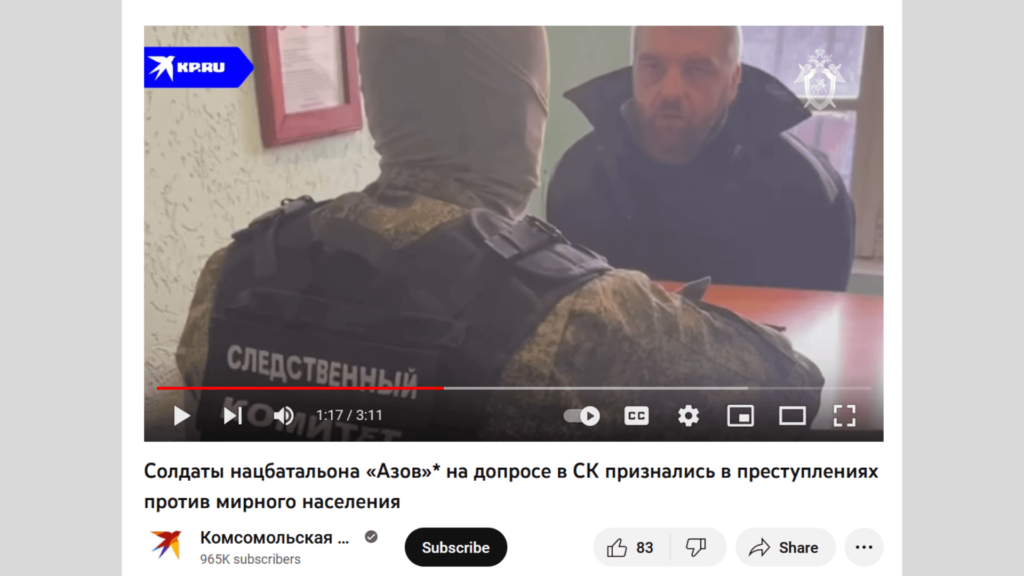
Screenshot of the video posted by the Russians, in which we can see Butkevych. Inscription: “Under interrogation at the IC, the soldiers of Azov National Battalion have confessed to crimes against civilians.”
All three persons are recorded in the video posted by the Russians. The person who calls himself Viktor Pokhozey says (in fact, it is obvious that he is reading) that he is a senior operator of the anti-tank section at the fire support platoon of the operational company in Azov Operational Battalion (Military Unit 3057 of the National Guard of Ukraine).
Maksym Butkevych testifies that he is a platoon commander of Separate Battalion Berlingo. The person who calls himself Vladyslav Shel does not give the name of the subdivision. They talk about “the circumstances of the crimes” and admit their “guilt”.
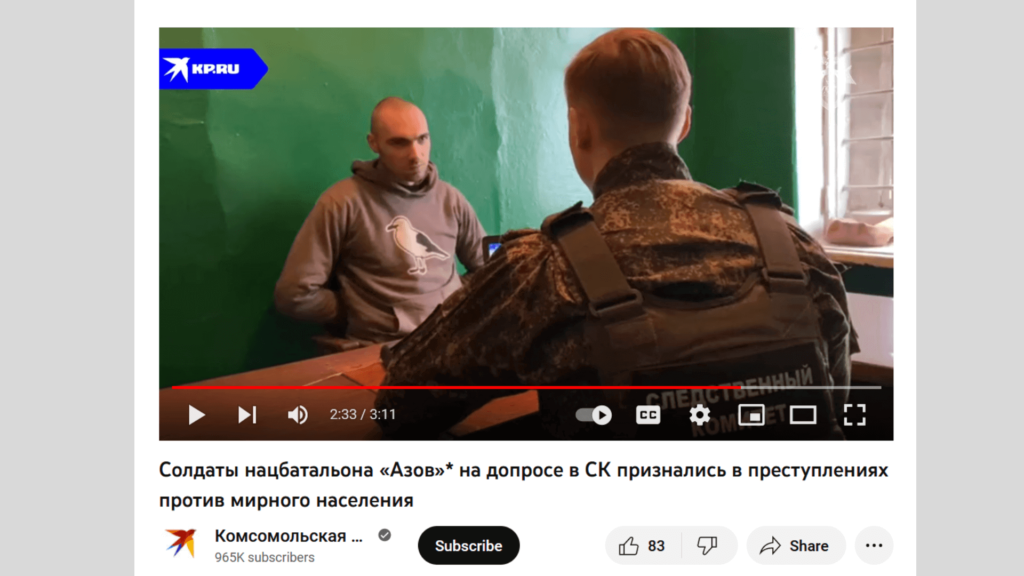
Screenshot from the video of Russian periodical Komsomolskaya Pravda, which shows Vladyslav Shel
It is known that after the start of the full-scale invasion, Butkevych signed a contract with the Armed Forces of Ukraine and that his subdivision, the 210th Special Separate Battalion Berlingo, was carrying out a mission in the area of Girske, Luhansk Region, where Maksym was taken captive in June of 2022.
Viktor Pokhozey and Vladyslav Shel might have been taken captive in Mariupol, where they were involved in the defense of the city.
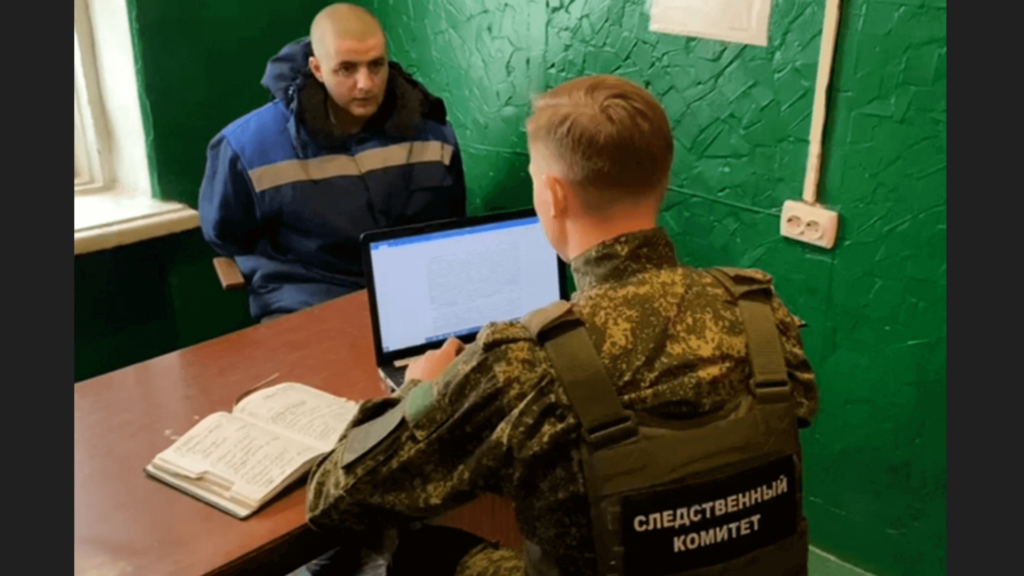
The screenshot shows a person who calls himself Viktor Pokhozey
Under the total control of Russia and in the conditions of torture
Alina Pavliuk, a lawyer from the Ukrainian Legal Advisory Group (the organization included in Ukraine 5AM Coalition) says that the right to a fair trial is one of the main guarantees that must be provided in armed conflict concerning the protected categories of persons.
“Speaking of servicemen’s detention, they are under the power of the adversary party in an armed conflict. Since the moment of detention, they have the status of prisoners of war and, consequently, the guarantees provided by the Third Geneva Convention and the First Additional Protocol thereto,” she explains, “The guarantees include fair trial, which prohibits persecution of combatants solely for their taking part in hostilities. The only lawful possibility of such actions is prosecution for war crimes committed by such combatants.”
The question arises whether the POWs who are citizens of Ukraine, had the guarantees of protection and whether all the facts were established and all the circumstances of the case were verified without prejudice.
“The fact that, according to the IC RF, all three admitted their guilt raises doubts that such “confessions” could be admissible evidence in such proceedings, as the military stay at a place of unfreedom, where they are very likely treated cruelly. Moreover, the big question arises concerning the impartiality of such proceedings and the applied law. Because, speaking of the legal actions that take place in so-called “LDNR” (Luhansk and Donetsk People’s Republics), they apply their own “law”, which does not correspond to democratic principles and, under the provisions of the Geneva Conventions, it shall not be applied in this case.”
According to the lawyer, such facts of “conviction” may be deemed as a violation of fair trial concerning the protected categories of persons.
Not the first verdicts
It should be noted that such “sentences” to the Ukrainian military are not the first ones. Russia-controlled quasi-courts in ORDLO (Separate Districts of Donetsk and Luhansk Regions) have been pronouncing them since 2014. Thus, before, in the occupied territories, servicemen Serhiy Glondar and Oleksandr Korinkov, taken captive in Debaltseve in February of 2015, had been convicted. The so-called supreme court in Donetsk meted out up to 30 years of colony for them, and tanker Bohdan Pantiushenko, who spent five years in captivity, received a “sentence” of 18 years of imprisonment in “DNR”.
“First we were prisoners of war. Then a delegation came: “prosecutors”, “investigators”, and they started working with each of us. They informed us that we were “in the status of suspects”. The “investigator” had even prepared the text of my imaginary testimony. I just had to sign it. He says: “Sign, you want to be exchanged, don’t you, save me extra work of proving.” I gave it a thought and agreed. There were no witnesses, all was only “from my words”. The main point is that I did not admit my guilt in full. Like the other guys, I said that I was a military, I had been in the zone of ATO (Anti-Terrorist Operation in the eastern part of Ukraine), carried out military orders, and defended the country’s integrity,” recalled Bohdan Pantiushenko after the exchange when talking to MIHR.
Then there was a “trial”. The first session did not take place because the “defense lawyer” did not come. At the second session, I was convicted. The session lasted 20 minutes. First I wanted to have a normal conversation with the “judge”: to put up a lecture, but then I decided that I had no use for that. When the “prosecutor” was reading the charge, she was discussing nails with the clerk. Then the “judge” took out two volumes of the “case”: “Must we read everything?” I said that it was not worth it. She agreed: “If the defense lawyer and the prosecutor don’t mind, we will skip it.” Then there was a hearing of arguments. That’s when we had some skirmish with the “prosecutor”. I said to him that I was fulfilling my duty of defending my state, and he told me about the “ethnic hostility”. In the end, he asked to sentence me to life in prison under two articles and to 15 years under one more article. The defense lawyer said that if I did not plead guilty, it should be “somehow commuted”. I refused to say the last word. I did not want to join that circus again. The “judge” went to the consultation room. Then she came out and awarded me 18 years for a diversion: the explosion of Putylivskiy Bridge, attempt to overthrow the government, and preparation to terrorist activity,” Pantiushenko recalled.
After the start of the full-scale invasion of Ukraine by the Russian Federation, two foreign citizens who were servicemen in the Armed Forces of Ukraine were taken captive when leaving Mariupol. They were “adjudged” to die. Later they were included in the exchange, like Pantiushenko, Glondar and Korinkov, and came back either to the territory controlled by the Ukrainian government or to third countries.
It should be noted that even before the full-scale invasion, the Media Initiative for Human Rights had started researching the quasi-legislative system created by Russia in the occupied parts of Donetsk and Luhansk Regions and preparing the report “Quasi-Legislative System in the Occupied Territories: Implementation and Spreading of the Practices”. The analysts of MIHR studied the activity of pseudo-law enforcement authorities, pseudo-courts, and pseudo-advocacy by interviewing released hostages and POWs and using the information in the public domain and in our own sources from the regions temporarily controlled by the Russian Federation.
Translated from Ukrainian by Olena Balatska


